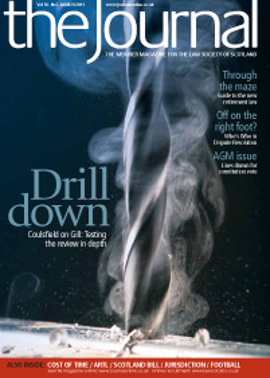Updating the constitution

YES: Time to face the future
A new constitution will be presented to members at the Annual General Meeting on 25 March. It marks the culmination of three years’ hard work and a lot of listening to our members.
Our existing constitution has remained largely unchanged since the Society was formed in 1949. Back then, we were a membership of 3,500 solicitors, almost all private practitioners in traditional firms.
The profession today could hardly be more different. There are now more than 10,500 solicitors, with more than a quarter employed in-house. A further third are employed in the private client sector. All practise in a world unrecognisable to a pre-1950 solicitor. We have seen exponential growth in legal services in Scotland and across the globe, driven by an increasingly competitive market, legislative change and huge advances in technology. Just as our profession has responded to such change, so too must its professional body.
The profession is facing many big issues – the economic downturn, public sector cuts and changes to legal aid to name just a few. That is why we need more modern and more flexible rules by which our Society is organised. That way, we can be truly fit for purpose and meet the needs of our members, both now and in the future.
We also have to face up to the reality of the Legal Services (Scotland) Act 2010, with its introduction of alternative business structures (ABS). Although the principle of ABS was one that provoked strong views both for and against, the view of the membership on the regulation of ABS could have hardly been clearer. Over 80% of members who voted in last year’s referendum wanted the Society to become an approved regulator of ABS. That is why the new constitution provides some of the framework to make this happen, such as the new Regulatory Committee.
However, it would be wrong to think this new constitution is all about ABS. The truth is that we would have wanted to change our constitution, even without the Act.
In looking at these big issues, it was right that we listened to you, our members. That is why we ran several consultations, from which we were given valuable input from local faculties and bar associations around Scotland as well as the Scottish Law Agents Society and Royal Faculty of Procurators in Glasgow. Last November, we conducted an online survey and got a fantastic response. Over 1,200 members took part, and the results shaped and in some cases changed what was being proposed.
So what does the new constitution do? Well, it makes many of the changes that you, the members, told us you wanted.
A number of those who responded to our consultations, along with 59% of those taking part in the online survey, were in favour of a smaller ruling Council. Although we had initially proposed a larger Council, we listened carefully and the constitution now proposes a smaller Council. However, we have also kept the local constituency link for elected members and allowed co-options to Council, two things that members told us were important.
Many members said they wanted to change the way we run general meetings, not least because of the difficulties we faced with some of our meetings last year. Of most significance is the introduction of qualified majority voting on motions. Two thirds of our survey respondents agreed this was a better way of dealing with motions, rather than requiring a motion to be passed at two successive general meetings. We are also planning to increase the number required to call a general meeting to 50 – the same number as the quorum for the meeting. Again, a majority of members responding to the survey said they were in favour of an increase.
Your elected Council members have debated the revised constitution in great detail for three years. I know because I have been at all the meetings myself! We have listened to what our members have told us. We have also taken the opinion of senior counsel, who believes the proposed new constitution is fit for purpose and achieves a proper balance between the rights of our members and Council’s statutory duties.
However, it is now for our members to decide and it is important for the views of the membership to be heard. I would urge you to attend the AGM in Glasgow on 25 March if you can or to submit a vote by proxy. That way, you can ensure your view is properly expressed in this important debate.
Your Council is proposing that the Society adopt the proposed constitution to allow the Society to move forward and be the flexible, forward-thinking organisation that the legal profession needs and deserves. I would urge you to support your Council and its ambitions.
NO: Wrong time, wrong document
The legal profession, for the regulation and representation of which the Council of the Law Society has managerial responsibility, is beset by:
- the exclusion of many small firms from residential conveyancing by the actions of Lloyds Banking Group and other lenders;
- the increasing replacement of private practitioners by state employees in legally aided court work;
- a damaging division in the profession in reaction to each of the above;
- widespread redundancies and short time in the teeth of a grim recession;
- a weak housing market exacerbated by continuing problems from the operation of discredited home reports;
- prospective exposure of the profession to unequal competition with externally capitalised and unqualified legal services providers.
While these problems threaten the survival of an independent profession and call for outward-looking leadership, the Council looks inwards and addresses itself to the writing of its own new constitution. This is the wrong time for that exercise, fails to focus on the real issues of the moment, and does not provide the leadership, regulation or representation which is called, and paid, for in these circumstances.
It is the wrong time especially because the near future holds possibilities which would so change the landscape of legal professional service that further constitutional change is likely to be called for. It would appear to make sense therefore to hold up the changes to the constitution until we find out whether or not the profession is to be joined in the provision of legal services by those ABSs envisaged by the Legal Services (Scotland) Act 2010 and whether the Society is to regulate the same or, if not, who is to do so; and it seems to make very little sense to attempt to finalise a constitution while these balls are still in the air.
Solicitors can hardly be expected to focus on constitutional issues when fighting on so many fronts for survival, and it would be an immense misfortune if these distractions led the profession to permit this document to proceed, because it is seriously flawed.
Never mind that our representative body proposes that its ruling Council should not be bound by majority decisions of its own general meetings (article 12.10); never mind that it seeks to continue and exacerbate the conflict of acting as both regulator and representative for the profession; and never mind that it provides for that regulatory function to be extended to other businesses with whom the profession may well be in competition and even conflict: because the real horror show is neatly hidden away in article 16.1.3 which authorises Council to set out in its own standing orders (which cannot be overseen, challenged or adjusted by the members), the detailed provisions for the regulation, including accounting requirements, of the ABSs or non-solicitor-controlled legal service providers promised by the 2010 Act.
Therefore our future profession, in which the members guarantee without limit and down to their houses, chattels and possibly even pension funds, each other’s honesty – but with a clear sight of and control over the strict accounting requirements and standards which govern all concerned – will now be obliged to extend that guarantee to those non-solicitor-controlled entities over whose accounting requirements and standards they will have no input, say or control. The device of regulating ABSs by means of standing orders tacked on to the constitution of solicitors is completely misconceived and proposes an immense threat to the survival of the Guarantee Fund and even the personal financial standing of solicitors.
Further, my own understanding is that the Council may even intend to extend the Master Policy to ABSs/legal service providers under the auspices of article 16.1.3; but surely this would pose an unacceptable risk upon the policy. Nevertheless, 16.1.3 would appear to allow Council to impose this risk upon the profession – through standing orders. On the face of it, the new constitution would allow Council to do these things, all without reference to the membership of the Society and, in particular, without reference to those solicitors whose money funds the Master Policy.
However, even if the foregoing issues are matters of debate and opinion, the constitution is fatally holed below the waterline in article 16.1.4, which simply authorises Council to use standing orders for anything it sees fit. With that provision, no constitution is required and, even if one is put in place, Council is authorised by that constitution to do whatever it sees fit, without restriction by the terms of that constitution, and again without reference to the membership of the Society. The draft constitution is the wrong document at the wrong time and should be voted down.
In this issue
- The case for full disclosure of laboratory case files
- Why join the Scottish Family Law Association?
- Above board
- Time to be counted
- Taking out rejections
- Updating the constitution
- Every bit helps
- Retiring the default age
- Keeping a grip on cash
- Watch this space
- The diehards
- Win-win ways
- "Virtual fair" opens for career options
- Law reform update
- Society's in-house work under scrutiny
- Watching over the constitution
- All aboard life's U-bend
- Ask Ash
- Working to advantage
- Frauds and scams beware
- Lay help... official
- Lacuna manufacturing
- This time it's NOT personal
- Fairness and trust
- Pensions: redefining value
- Sharing the spoils
- World IP Day 2011 approaches
- Life v reputation
- Book reviews
- ARTL, by degrees
- Contaminated land - the story continues






